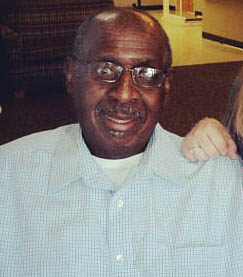
Mr. Claudius Watts
What Is PACE?
About the Author

Mr. Claudius Watts and writer Brelyn Powell.
—I suddenly had a feeling that the friendly warmth I had sensed in Mr. Watts’ gaze when we first met was a direct result of his time spent at the PACE Center, where he felt cared for and was able to socialize. All preconceived notions I had towards elderly care were suddenly shifted. I was no longer anxious at the thought of visiting; I was grateful to know that I had no reason to be, for the elderly at the PACE Center, based on Mr. Watts’ demeanor, were in good hands.—Brelyn Powell
What is P.A.C.E.?
Riverside PACE, or Program of All-Inclusive Care for the Elderly, offers our elders the opportunity to participate in a program that enriches their lives by allowing them to remain independent in their homes and communities. PACE is a not-for-profit program, funded through Medicaid and Medicare. In order to participate in the PACE program, one must be age 55 or older and living within the service area. One must qualify for nursing facility care by a State of Virginia Assessment and able to live in the community safely with the support of the PACE team. The PACE team, consisting of medical staff, social workers, home care coordinators, transportation providers, and many others, develop a personalized plan for each participant that specifically caters to their medical and social needs.
PACE’s mission is to empower each participant to live independently in their homes and in the community for as long as they safely can. The PACE team even conducts home visits to check the safety of participants’ homes and to ensure the home is hazard-free in order to keep participants safe and healthy! ◊


Sophomore BRELYN POWELL didn’t know what to expect when beginning her project, but she is very happy with the result. “I like getting to know people I probably wouldn’t get to know otherwise and be able to write about their stories.” Powell chose to writing as her method of documenting her subject because she likes observing people and portraying them in a certain way with her words. She would like to continue to pursue writing and a magazine editing career.
—Cole Underwood
"Sing While You Have A Chance"
by Brelyn Powell
—Just then, without any hesitation, Mr. Watts burst into song right in front of me. Read on to hear Mr. Watts' song in an audio clip.
In high school, I volunteered at a nursing home with the foreign language club for which I held an executive position. After each day of volunteering, I would drive home in a state of emotion that I couldn’t even name. The elderly people I visited, all so seemingly helpless and stationary, seemed to have no other shining moment in their days aside from my visit. Noticing this, I was left feeling a horrible mixture of the most positive feelings for brightening their day, and the most negative feelings just knowing that a visit from me, a stranger, was what they looked forward to.
I have a confession to make: I put off my first visit to the Riverside’s PACE, Program for All-inclusive Care for the Elderly, Center as long as I could manage. I was afraid, not of elderly people or hospitals or anything like that, but of my inability to contain my emotions. To make me feel better about procrastinating my visit, I did research. I learned that the elderly people at the PACE Center are referred to as “participants.” I imagined a cold, impersonal facility at which no one bothered to get to know anyone, and all people brought there were nothing more than “participants.” This imaginary PACE Center in my mind did not seem welcoming. When it became clear that I could no longer postpone my visit—my class documentary project deadline was approaching—I set out with my nerves in knots and my hopes as high as I could manage to set them.
I arrived, left my anxiety in the parking lot, and entered the building. The actual PACE Center was much more inviting than the one from my imagination. The friendly Recreational Therapy Manager, Adrian Atkins, greeted me warmly and directed me to the main room, Hampton Lane. This is where most of the participants were lingering as they had just finished their lunches, I was told.
In the dining room, there are a good number of tables scattered throughout and at each table sat two or three participants. A few of the tables were glistening from the after-lunch clean up. The lingering smells of lunch and sanitizer filled the room. I singled out a man in a wheelchair who sat alone at one of the tables. I noticed he was the only person sitting alone and felt that familiar twist in my stomach, but I suppressed my irrational emotions. Adrian saw which participant I’d set my sights on and said, “Oh, that’s Mr. Watts. If you want someone who’ll talk, he’s a good one. Ask him about Mary…you see, Mr. Watts has himself a crush here at PACE.” At the mention of a romance, I was hooked.
I approached Mr. Watts and we introduced ourselves. The warmth behind Mr. Watts’ stare immediately relieved any stray anxiety that had not been shed since I entered the building. He shook my hand and exclaimed, “How come no one told me I was getting a visit from such a pretty young lady today?” I laughed and instantly felt at ease as we began our conversation, which at first, consisted mostly of talk about the PACE Center and how he came to be there. Mr. Claudius Watts began going to the PACE Center in December, a month after his wife’s passing, which had left him living alone.
Mr. Watts told me about the PACE Center’s recent fourth anniversary celebration, making a point to happily remember the ice cream and cake that was served, just like at an actual birthday party. “PACE has been open four years, and I’ve only been here since December, but I find it’s really interesting. I don’t want to even miss a day,” he said. At this point, a congenial staff member interrupted us to sanitize the table at which we sat.
I observed Mr. Watts, who, despite the pause in our conversation, still seemed lost in thought. “But I’ll tell ya,” he said, “I really love this place. I wake up with it on my mind.” Mr. Watts laughs admitting that he gets himself up at five o’clock in the morning to get himself ready for the PACE employees to pick him up in one of the many PACE buses.
He was overwhelmingly positive about the PACE Center, regardless of it being the solution to a despairing situation he faced most days before PACE. Now, he’s anxious and eager.
“I mean, all day long I’ll be looking at the clock and see a certain time that I know means the bus is coming to pick me up and I say, ‘What’s going on?’ I don’t like missing out on the activities that don’t start until it’s about time for me to go home. I’d rather just stay.” At PACE, he’s made “a lot of friends. In fact, yesterday, I uh, presented one friend with some roses.”
There it was. The romance I’d been waiting to hear about!
“It was a lady that I met during Christmas, and she didn’t know my name but she gave me a Christmas card and I thought that was really nice and we began to eat together and we began to talk. We talked about different things and what we like about life and what we expect out of life. She loves singing too…in fact, we did a duet here during one of the church services we have on Wednesdays. She’s a fine person…her name is Mary.”
Although Mr. Watts’ interest in Mary was intriguing, he had just revealed to me something else about himself that grabbed my attention full force. Mr. Watts was a man of music.
“Mr. Watts,” I asked, “Do you sing?”
“Oh yes, I love me some gospel,” he said. I had to know more.
“Do you find a lot of people here who share your love for music like Mary does?”
Mr. Watts chuckled as he said, “Well, I know they love to hear ME sing! I had a lady tell me on the bus that I ride here, she said, ‘Y’all gonna have to watch Mr. Watts! I see all them ladies following behind him like a train!’”
I told Mr. Watts it seemed like he had developed a fan club and he humbly denied it.
“Oh no,” he said, “it’s just ‘cause I sing and they love to hear me sing. I talk a lot of junk just for fun, but that’s just the way I am.”
Gospel singing, he said, has always been an important part of his life.
“I’ve been singing a while. My voice ain’t like it used to be, but I can carry a tune. See, I’m 77 years old, so I sing while I got a chance.”
Just then, without any hesitation, Mr. Watts burst into song right in front of me:
